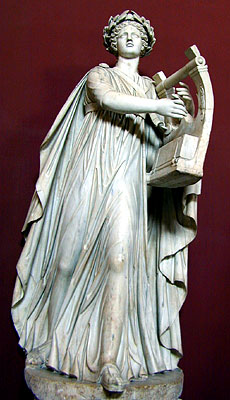Cultus Apollinis
| (24 intermediate revisions by 3 users not shown) | |||
| Line 1: | Line 1: | ||
| − | <div style="border:medium groove #800000;padding:1em">Leto was joined in love with Zeus who holds the aegis, and bore Apollon and Artemis delighting in arrows, children lovely above all the sons of Heaven. <br />-Hesiod, Theogony 920</div> | + | <div style="border:medium groove #800000;padding:1em;margin:0 1em 0 1em">Leto was joined in love with Zeus who holds the aegis, and bore Apollon and Artemis delighting in arrows, children lovely above all the sons of Heaven. <br />-Hesiod, Theogony 920</div>[[Image:Apollo citharoede .jpg|right|frame|''Apollo Citharoedus'', believed to be a copy of Skopas. The cult image housed in the temple of Apollo Palatinus is also Apollo with a ''cithara''.]] |
| − | Apollo is the ancient Greek god of healing, oracles and inspiration. He had no indigenous Roman counterpart, and until the end of the republic remained a foreign god with a temple outside the pomerium. He was | + | Apollo is the ancient Greek god of healing, oracles and inspiration. He had no indigenous Roman counterpart, and until the end of the republic remained a foreign god with only a single temple outside the ''[[pomerium]]''. He was worshiped in Rome primarily as ''Apollo Medicus'', Apollo the healer. Apollo was actually quite a minor god in Italy and did not become popular until the advent of Augustus who built a magnificent temple on the [[Palatine]] to him. His cult was supervised by the ''decemviri sacris faciundis'' in the [[Greek rite]]. |
| − | Dedication days, dies natalis, for his | + | Dedication days, dies natalis, for his temples: |
28 B.C. Apollo Palatinus: a.d. VII ID Oct. October 9 | 28 B.C. Apollo Palatinus: a.d. VII ID Oct. October 9 | ||
| Line 12: | Line 12: | ||
Ludi Apollinares: prid non -III ID Quinct. July 6-13 | Ludi Apollinares: prid non -III ID Quinct. July 6-13 | ||
| − | + | In 430 BCE, the [[Temple of Apollo Medicus]] was dedicated to Apollo on account of a plague. Located near the Theater of Marcellus, three fluted white marble Corinthian columns of this temple were re-erected in modern times. Fragments of this temple are found in the [http://www.centralemontemartini.org/it/museo/percorso_salamacchine_apollo.htm Montemartini Museum]. | |
| − | [ | + | |
| − | + | During the Second Punic War in 212 BCE, the [[Ludi Apollinares]] were instituted in his honor. | |
| + | Lyre and flute playing are a mark of the ''ritus Graecus''. During the republic, in Rome, the cult of Apollo was headed by a magister of a ''societas cantorum Graecorum''. Choral singing was also included in the Saecular Games of Augustus. | ||
| + | |||
| + | ==INSCRIPTIONS== | ||
| + | |||
| + | 141-146: Apollo, as it is prescribed for you in those books - and for this reason may every good fortune attend the Roman people, the Quirites - let sacrifice be made to you with nine popana, and nine cakes, and nine phthoes. I beg and pray. [The rest as above.] Apollo, just as I have offered popana and prayed to you with proper prayer, for this same reason be honored with these sacrificial cakes. Become favorable and propitious. [The same was said concerning the phthoes. To Diana in the same words.] <ref>{{CIL|VI|32329}}. 10 sqq. Acta Sacrorum Saecularium addition</ref> | ||
| + | |||
| + | ==References== | ||
| + | <references/> | ||
| + | *Gage,"Apollon Romain" | ||
| + | *Gage, "Apollon Imperial" | ||
| − | |||
[[Category:Roman Gods]] | [[Category:Roman Gods]] | ||
Latest revision as of 14:28, 30 June 2011
-Hesiod, Theogony 920
Apollo is the ancient Greek god of healing, oracles and inspiration. He had no indigenous Roman counterpart, and until the end of the republic remained a foreign god with only a single temple outside the pomerium. He was worshiped in Rome primarily as Apollo Medicus, Apollo the healer. Apollo was actually quite a minor god in Italy and did not become popular until the advent of Augustus who built a magnificent temple on the Palatine to him. His cult was supervised by the decemviri sacris faciundis in the Greek rite.
Dedication days, dies natalis, for his temples:
28 B.C. Apollo Palatinus: a.d. VII ID Oct. October 9
431 B.C Apollo in pratis Flaminiis: III ID. Quinct. July 13
Festivals: Ludi Apollinares: prid non -III ID Quinct. July 6-13
In 430 BCE, the Temple of Apollo Medicus was dedicated to Apollo on account of a plague. Located near the Theater of Marcellus, three fluted white marble Corinthian columns of this temple were re-erected in modern times. Fragments of this temple are found in the Montemartini Museum.
During the Second Punic War in 212 BCE, the Ludi Apollinares were instituted in his honor.
Lyre and flute playing are a mark of the ritus Graecus. During the republic, in Rome, the cult of Apollo was headed by a magister of a societas cantorum Graecorum. Choral singing was also included in the Saecular Games of Augustus.
INSCRIPTIONS
141-146: Apollo, as it is prescribed for you in those books - and for this reason may every good fortune attend the Roman people, the Quirites - let sacrifice be made to you with nine popana, and nine cakes, and nine phthoes. I beg and pray. [The rest as above.] Apollo, just as I have offered popana and prayed to you with proper prayer, for this same reason be honored with these sacrificial cakes. Become favorable and propitious. [The same was said concerning the phthoes. To Diana in the same words.] [1]
References
- Gage,"Apollon Romain"
- Gage, "Apollon Imperial"
